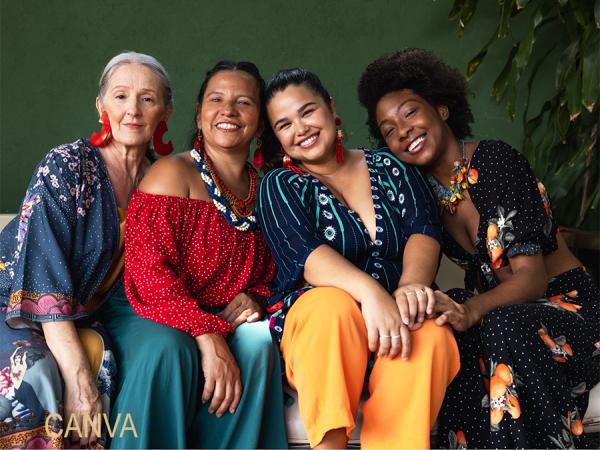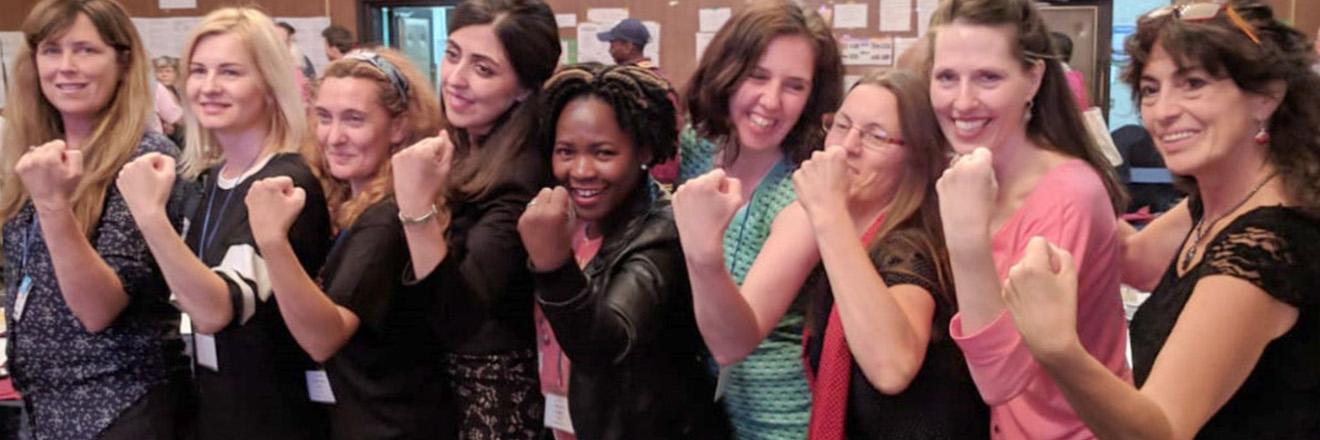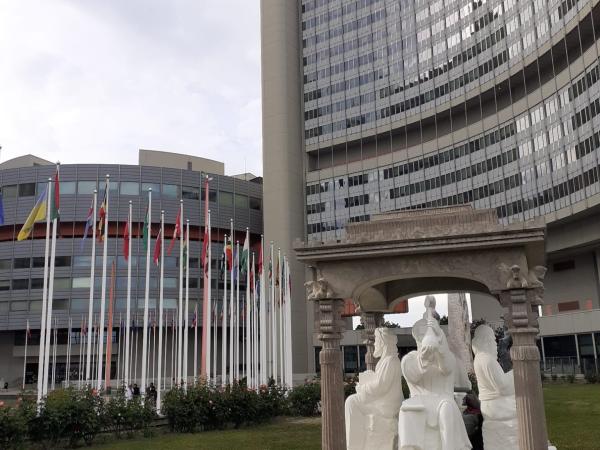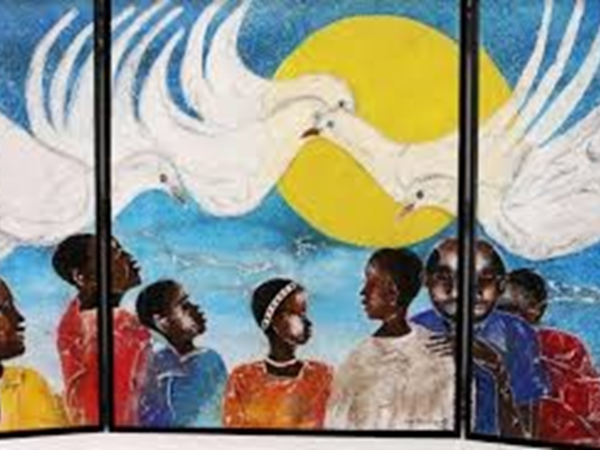No lasting peace without economic and social equality.
Servas International firmly believes that there can be no lasting peace without economic and social equality. Substantial reduction in poverty is therefore a crucial prerequisite in ensuring peaceful coexistence and cooperation globally.
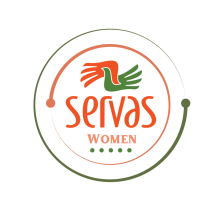
Servas Women is a body within Servas International created to empower women and share their needs for basic human rights.
Servas Women
Supports the empowerment, equality, and human rights of women and girls, advocating for their full potential and equal voice in building peaceful communities. As part of Servas International, it promotes peace through intercultural dialogue, global support networks, and safer travel and hosting.
UN Women
Promotes global gender equality, human rights, and empowerment of women and girls, working to eliminate discrimination, accelerate progress, and ensure women’s leadership, economic security, freedom from violence, and influence in peacebuilding and development.
"Servas International requests UN Member States to take all possible steps to: stop arms delivery and redirect military funds to humanitarian causes; protect women and girls from gender-based violence; and promote women’s involvement in leadership roles in ending conflict and building peace."
SERVAS WOMEN
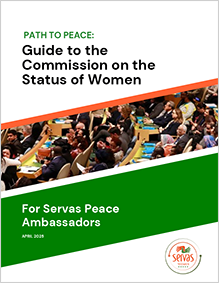
Path to Peace: Guide to the Commission on the Status of Women (PDF)
A guide for Servas Women
2026, March | New York
Participation of Servas members in the United Nations' Commission on the Status of Women Conference (CSW70)- 9-20 March 2026
The 70th session of the United Nations Commission on the Status of Women (CSW70) will take place at UN Headquarters in New York from March 9- 20, 2026. This is a conference on women's rights and gender equality and examines the reality of women’s lives throughout the world. CSW sets goals and shapes global standards on gender equality and women's rights and empowerment. CSW70 in 2026 will focus on ensuring and strengthening access to justice for all women and girls, including by promoting inclusive and equitable legal systems, eliminating discriminatory laws, policies, and practices, and addressing structural barriers.
I- Voices Across Borders: Women’s Solidarity Networks Advancing Access to Justice
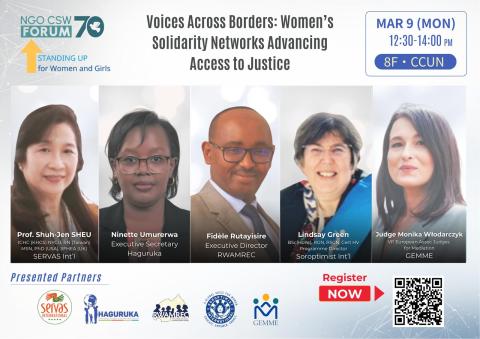
March, 9 at *12.30pm EST* (check your local time)
This parallel event panel will explore how women’s solidarity networks that transcend borders advance access to justice and gender equality and how that translates into governmental structures . It will highlight how shifting populations utilize dialogue and intercultural exchange to amplify women’s voices, strengthen movements, and support survivors of violence. Through dialogue and shared experiences, the event will identify collaborative pathways linking grassroots justice efforts to global advocacy for systemic change.
II- Beyond Justice: Women Empowering Inclusion Across Borders and Digital Futures
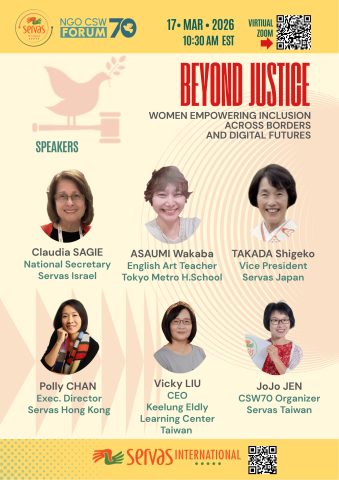
--> Zoom link for March 17 at *10.30am EST* (check your local time)
This Servas International virtual parallel event explores how women across Israel, Taiwan, Japan, Korea, and other regions advance justice through education, cross-border exchange, and community participation. Speakers will examine how women overcome structural barriers in male-dominated environments, and how digital inclusion has become a critical justice issue—especially for elderly women who are excluded when public services and community systems shift to online.
III- Women and Climate Justice: Women's voices among survivors of Climate Catastrophe
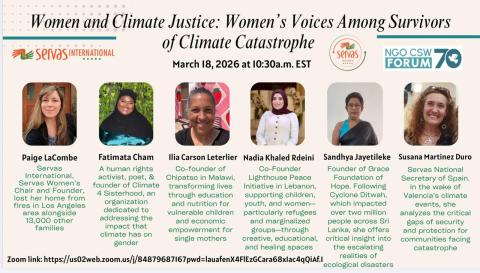
Zoom link for March 18 at *10.30pm EST* (check your local time)
At this Servas International event during CSW70, women leaders share frontline experiences of climate disasters and recovery. Lila Carson-Letelier’s youth education initiative, Fatima Cham’s Climate 4 Sisterhood advocacy, Nadia Khaled Rdeini’s refugee-centered Manara work, Sandhya Jayetileke’s cyclone relief, Paige LaCombe’s Altadena rebuilding with Altadena Seed Library and Susana Martinez's analysis of the Valencia's floods impact on security and protection of victims--highlight resilience and justice.
IV- Social Justice in Kenyan Homes: Gender-Based Violence, Law, Culture & Pathways to Community Support
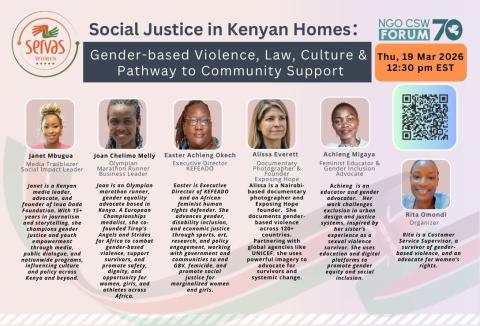
Zoom link for March, 19 at 12.30pm EST (check your local time)
Gender-based violence in Kenyan homes remains one of the most urgent social justice issues today. Rising cases of intimate-partner violence, femicide, child abuse, and cultural silence have left victims unsure of where to turn for help, and many continue to experience trauma without access to safe spaces, counseling, or legal support.
This Servas Women Kenya parallel event will examine how law, culture, community norms, and existing support structures influence the experience of justice for women in Kenya. The discussion will explore the gaps that limit survivors’ access to justice, the stigma faced by both women and men who experience domestic violence, and how harmful cultural norms continue to normalize abuse in homes.
The event will highlight the importance of community-based protection, psychological support, early intervention, and survivor-centered justice. Participants will also discuss where victims can realistically turn for support—from local chiefs, legal systems, safe houses, counselors, churches, NGOs, and women’s groups.
2025, March | New York
UN Commission on the Status of Women (CSW69)
Servas International is excited to host five dynamic parallel events at the NGO CSW69 Forum, creating vibrant spaces for dialogue, connection, and action toward gender equality and peace. Join us as we amplify voices, share insights, and work collectively to empower women and girls worldwide.
I- March, 17 | Women with Disabilities: Vocational rehabilitation and leadership training for advocacy
Vocational rehabilitation is a process that helps individuals with disabilities and chronic health conditions to obtain and retain employment. Vocational rehabilitation can facilitate economic empowerment of women with disabilities by supporting their participation in the workplace. The philosophy of vocational rehabilitation and United Nations’ resources on disability and rehabilitation will be reviewed. The inclusion of women with disabilities in society will be discussed by Mobility International USA (MIUSA), who created the Women’s Institute on Leadership and Disability (WILD). MIUSA will share key principles that make WILD a model leadership training for women with disabilities and how it has been adapted in communities throughout the world.
II- March, 18 | Feminine Narratives: The Role of Women in Peacebuilding in Colombia
Feminine Narratives: The Role of Women in Peacebuilding in Colombia" explores the fundamental role women play in peacebuilding in Colombia, highlighting their multiple roles as victims, leaders, and agents of change in their communities. The panel will address social initiatives led by women, emphasizing their contributions to conflict transformation, the inclusion of a gender perspective in the Peace Agreement, and the promotion of social justice. Through the narratives of Colombian women, the discussion will focus on how their daily efforts strengthen peace and contribute to social reconciliation, playing a crucial role in building a more equitable society.
III- March, 19 | East African Women share their stories of resilience in the face of adversity
These challenges are multifaceted, including lack of available quality healthcare, economic inequalities, increased need for health education, intertwined with cultural beliefs about abortion and reproductive rights. Addressing these issues requires a comprehensive approach for girls and women of all ages that includes improving healthcare infrastructure, increasing access to skilled doctors and nurses, providing affordable health insurance, enhancing education by dispelling misconceptions and misinformation, and advocating for gender rights to make informed choices about reproductive health.
This panel will discuss why it is essential to legally empower women to make their own decisions and to provide access to a safe healthcare system. We believe this will improve women’s autonomy and overall health outcomes in the region.
IV- March, 21 | Intercultural Exchange from Asia and Africa: Stories of Women’s Empowerment
This groundbreaking collaboration between Servas Asia and Africa highlights inspiring stories of empowerment. Professor SK Song from Korea will explore how intercultural exchange activities empower women and amplify their voices. Lillian Olero, a public primary school teacher from Kenya, will discuss fostering rural women’s leadership through intercultural exchange. David Kabambo, a Tanzania CEO of Peace for Conservation, will share his project- engagement of women in wildlife preservation and promoting equity as a fundamental human value. Finally, Vicky Liu from Taiwan will emphasize the importance of intercultural exchange in breaking down prejudice, enhancing understanding, and fostering peace.
Intercultural exchange nurtures understanding, confidence, and inspiration, empowering women to lead change in their communities and beyond.
V- March, 20 | Experiences of women in Brazil and Argentina
This event highlights the work of women in Brazil and Argentina who lead circular economy and sustainability initiatives through cooperatives such as Coopercuc, ASCAMAI and GROW. Coopercuc fosters economic autonomy in Bahia with umbu products, while ASCAMAI preserves the tradition of mangaba harvesting in Sergipe, Brazil, promoting sustainable practices and the economic empowerment of local communities. GROW, in Argentina, promotes diversity and inclusion policies as a basis for sustainability. These initiatives have transformed communities, reinforcing female leadership and promoting fair and sustainable models. The event seeks to inspire similar practices to build an equitable and sustainable future.
2024, October | New York
Written Statement for CSW69 to UN Women
This is a written statement that addresses Beijing +30 from Servas International perspective as an NGO focused on peacebuilding.
2024, March | New York
UN Commission on the Status of Women (CSW68)
Follow-up to the Fourth World Conference on Women and to the twenty-third special session of the General Assembly entitled “Women 2000: gender equality, development and peace for the twenty-first century”.
This three-page statement focuses on women and poverty and highlights three specific areas where women are most vulnerable: in food production, natural disasters, and armed conflict.
2024, March | Online
Women, poverty and discrimination
In today’s world almost 700 million live in extreme poverty. Out of these 383 million are women and girls and 19% of them are extremely poor and are from the marginalised and vulnerable nomadic and indigenous community. Women from these communities are often confronted with discrimination, malnutrition, lack of access to basic services like electricity, safe drinking water, sanitation, decent housing, education and health facilities. In line with the overall objectives of CSW68 the plight of these groups from India and Mexico will be deliberated and essential alleviation measures to improve the well-being and living conditions would be elaborated.
Indigenous nations of U.S. and Canada
Poverty sources, solutions and collective vision.
Speakers:
- Elder Philomene Stevens of the lethka Stoney Nakoda Nation
- Denisa Livingston of Dine Nation
- Baabiitaw Boyd of Mille Lacs Band of Ojibwe Nation
Live streamed on March 18, 2024 at the United Nations Commission on the Status of Women.
Empowering Taiwan's womens independent economic abilities through lifelong learning programs
Speakers:
Vicky Wenchi Liu, Executive Director of the elderly learning center, Servas Taiwan
Shuh- Jen Sheu, Professor at the College of Nursing in National Yang Ming Chiao Tung University
Jojo Chihua Jen, National Secretary of Servas Taiwan
2023, May 7 | Online
How Servas International is connected to and participates in the United Nations.
Servas Canada hosted a teleconference event to explain how Servas International is connected to and participates in the United Nations. The event looked at SI's involvement in the UN's Commission on the Status of Women conference (CSW67) held in March 2023, and included reflections by Servas Canada members Julie Cormack and Kent Macaulay and Servas US members Rachel-Elion Baird and Natalie Petersen. Servas attendees from 14 countries discussed and offered suggestions for expanding Servas’ participation in future UN conferences and programs.
2023, March 13 | Online
UN Commission on the Status of Women (CSW67)
"Women and Girl's Access to Education in Afghanistan and Türkiye. Servas International Peace School", a presentation that was given at the United Nations 67th Commission on the Status of Women (CSW) meetings on March 13, 2023.
Education is a fundamental right, but in many parts of the world women and girls are deprived of this basic human right. Some governments (like the Taliban in Afghanistan) impose significant restrictions on women and girls that limit their choices and their freedoms; this silences them. The Servas International Peace School near Antakya, Turkey, offers a special educational opportunity to build goodwill and cultural understanding between local adults (and especially children) and Servas visitors. Today technology has a global reach; let us use this strategy to bring and expand educational opportunities to those who need it the most. Women and girls are tomorrow’s leaders; they deserve to be heard, not forgotten.
Contact: @email
See also
Join & support
Articles you might be interested in
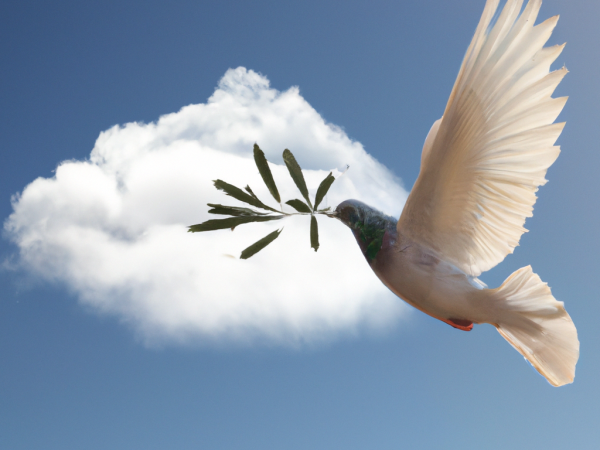
International day of Peace 2023
2023-09-28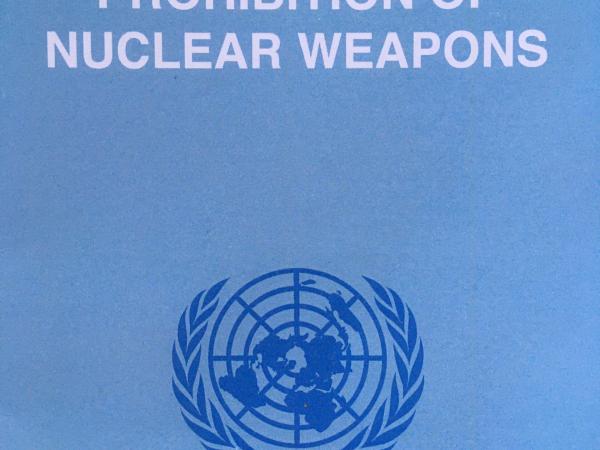
SI at Nuclear Ban Week in New York
2023-11-29